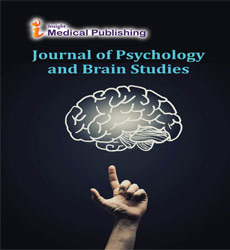Autism Spectrum Disorder: Integrative Therapies
Sushree Sunena*
Department of Psychology, Utkal University, Bhubaneswar, Odisha, India
- *Corresponding Author:
- Sushree Sunena
Department of Psychology
Utkal University, Bhubaneswar, Odisha, India
E-mail: sushreesunena04@gmail.com
Received Date: November 09, 2021; Accepted Date: November 14, 2021; Published Date: November 19, 2021
Citation: Sunena S (2021) Autism Spectrum Disorder: Integrative Therapies. J Psychol Brain Stud Vol.5 No.11:52.
Editorial
Autism spectrum disorder (ASD) is a diverse range of neurodevelopmental diseases characterised by impaired social communication and reciprocity, as well as restricted and stereotyped patterns of behaviours and interests. The prevalence of ASD has risen rapidly in recent decades, resulting in a form of "epidemic." It often affects boys more than girls (4:1) and is a lifelong illness that is typically diagnosed in early childhood. Despite public concern and scientific interest in this condition, there are still disagreements about the origin of ASD. ASD is thought to be caused by a combination of genetic and environmental factors.
Effective therapies for the main symptoms of ASD have yet to be developed. Behavioural therapies are evidence-based first- line treatments (such as TEACCH or ABA). Pharmacological drugs (such as risperidone or aripiprazole) are typically used to address behavioural signs of the illness, such as irritability or aggression. Unfortunately, despite the large effect sizes for these issue behaviours, the medication treatment to core symptoms has produced equivocal results and is occasionally accompanied by significant adverse consequences. In the case of autism, the first research on the efficacy of a gluten- and casein-free diet were undertaken in the 1990s, and they were primarily uncontrolled trials.
Although all of these studies found that the elimination diet significantly improved ASD symptoms, there were several methodological flaws, including the lack of a control group, poor diagnostic characterization, small sample sizes, the use of unstandardized outcome measures, and the absence of dietary adhesion control. In 2002, the first randomised controlled study was conducted. The ketogenic diet should be mentioned among other less popular dietary therapies for autism. The ketogenic diet is a low-carbohydrate, high-fat diet that has been successfully used in children with intractable epilepsy: this dietary regimen improves seizure control and has an effect comparable to antiepileptic medicines.
Food allergies mediated by IgE and non-IgE are quite common in youngsters. Food allergy could cause the onset of other neuropsychiatric symptoms, such as hyperactivity, or worsen existing behaviours in young individuals with ASD. TCM (Traditional Chinese Medicine) has been practised for over 2000 years in Eastern countries. It is founded on an original theoretical approach to diagnosis and treatment. It works by harmonising opposing energies (yin and yang) and the life energy (qi) that everyone possesses. To date, camel milk is the only functional food that has been studied in autism. Camel milk includes less cholesterol and lactose than cow milk, as well as more vitamins and enzymes, such as the peptidoglycan recognition protein (PGRP), which aids in the prevention of food allergies and the modulation of the immune system.
Nutraceuticals are defined as "any product that is food or a component of food that delivers medicinal or health advantages, including disease prevention and treatment." Nutraceuticals are typically dietary supplements (such as vitamins, minerals, amino acids, and herbal ingredients) or functional foods. Nutraceuticals, which are routinely utilised in ASD families, may provide a viable treatment for autism with few or no negative effects. Omega 3 supplementation is one of the most popular nutraceuticals. Omega 3 fatty acids are important polyunsaturated fatty acids that are found primarily in fish and seafood (eicosapentaenoic acid (EPA) and docosahexaenoic acid (DHA)) or seeds and grains (alpha-linolenic acid (ALA)). The idea underlying the use of omega 3 in autism is still being developed; nonetheless, it is generally recognised that omega 3 fatty acids are crucial for brain growth and function.
Another frequent ASD therapy is vitamin supplementation. The rationale for this treatment is based on the frequently reported vitamin and micronutrient deficiencies in children with ASD. Probiotics, according to the World Health Organization, are live microorganisms that have the potential to boost the host's health. Probiotics are microorganisms that belong to one of two groups: Lactobacillus or Bifidobacterium spp. The gut-brain link in autismhas gained a lot of attention in recent years: it is widely known that the gastrointestinal tract and the brain can impact each other. Music therapy is characterised as "a systematic process of intervention in which the therapist assists the client in promoting health, singing musical experiences, and the relationships that arise as dynamic drivers of change."
Open Access Journals
- Aquaculture & Veterinary Science
- Chemistry & Chemical Sciences
- Clinical Sciences
- Engineering
- General Science
- Genetics & Molecular Biology
- Health Care & Nursing
- Immunology & Microbiology
- Materials Science
- Mathematics & Physics
- Medical Sciences
- Neurology & Psychiatry
- Oncology & Cancer Science
- Pharmaceutical Sciences
